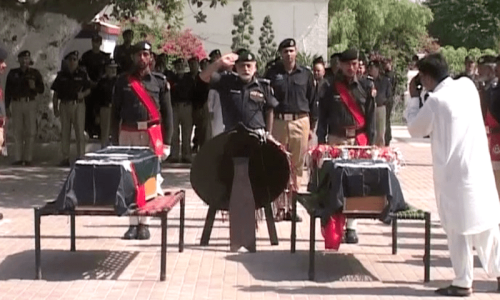JERUSALEM, Aug 3: Israeli security agents have been pressuring Gazans seeking medical treatment abroad to work as informers in violation of international law, an Israeli rights group said.
A report by Physicians for Human Rights-Israel said that Palestinian patients have “become an accessible and important target for the GSS (General Security Services) for the purposes of recruiting and gathering information.” This method of operation was due to the infrequency of direct contact between the Israeli authorities and Palestinian residents and to the vulnerability of the patient population, the report said.
The group suggests such tactics violate international law, citing the Fourth Geneva Convention, which explicitly prohibits coercing civilians into providing intelligence information.
The report includes 11 of some 30 sworn testimonies taken in recent months which describe security agents interrogating patients and appearing to make their entry from Gaza into Israel conditional on their recruitment as informers.
The patients describe being led to underground rooms at the Erez pedestrian crossing, where they are questioned for hours about neighbours and relatives.
“You have cancer, and it will soon spread to your brain, as long as you don’t help us,” security agents told one man, according to testimony provided to Physicians for Human Rights and AFP.
After around eight hours of interrogation the man was given permission to enter but by then had missed his appointment at an Israeli hospital. He had to reschedule and was not allowed to leave until two months later.
Another man, a farmer who had been wounded by a tank shell in 2006 and given emergency treatment in Israel, was asked similar questions in January when he received a permit to return to the hospital for a follow-up operation.
“They wanted information about the area where I’m from, about my relatives and neighbours. They said if I did not give them the information they would not let me leave,” he said. He was later sent back to Gaza.
The rights group documented cases in which patients were summoned for questioning or to receive exit permits only to be jailed in Israel and others where patients did not come to the crossing for fear of being arrested.
Israel has sealed the impoverished territory of 1.5 million people off from all but vital humanitarian aid since the Islamist Hamas movement — considered a terrorist group by Israel and the West — seized power there in June 2007.
Israel usually allows patients in need of emergency medical care to leave Gaza for treatment, but rights groups say the blockade has gutted local medical facilities, forcing growing numbers of residents to seek advanced care abroad.
Meanwhile the number of patients denied entry permits has increased, from 10 percent in the first half of 2007 to 35 percent in the first half of 2008, according to PHR-Israel, which assists nearly all those who are denied permits.
“Everybody that comes into Israel, we have to question them about the reason they are coming, especially if they are in a terror organisation,” Israeli Defence Ministry spokesman Shlomo Dror said.
“These people are not going to assist us, because the moment they come back to Gaza they are already suspected of being collaborators,” he added. “We do not waste time and effort on people who cannot help us.” But Miri Weingarten, a spokeswoman for PHR-Israel, says many of those who are interrogated have already received exit permits from Israel.
“We don’t question that Israel has to protect itself and that maybe it needs to find out something about a person who wants to enter. Our problem is that they are questioning (patients) about other people,” she said.
“You are not allowed to use civilians as part of the conflict,” she added.
Dror is less sympathetic. “I think once a person decides to join a terror organisation we do not have to bring them into Israel for treatment... Hamas took over, they should take care of these people.”—AFP














































Dear visitor, the comments section is undergoing an overhaul and will return soon.